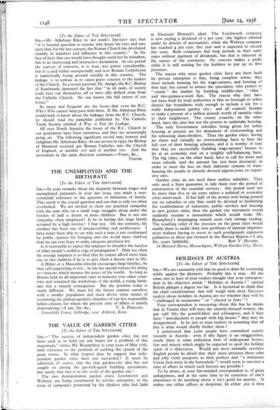THE VALUE OF GARDEN CITIES
[To the Editor of THE SPECTATOR] SIR,—" The success of independent garden cities has not been such as to hold out any hopes for a problem of this magnitude," writes Mr. Boumphrey in your issue of May 27th, with reference to the problem of curbing the spread of the great towns. In what respect does he suggest that inde- pendent garden cities have not succeeded ? It must be admitted, of course, that the true garden-city idea has not caught on among the get-rich-quick building speculators, but surely that fact is to the credit of the garden city !
The two demonstration garden cities, Letchworth and Welwyn, are being constructed by private enterprise, in the form of companies promoted by the idealists who had faith in Ebenezer Howard's ideal. The Letchworth company is now paying a dividend of 5 per cent. (the highest allowed under its articles of association), while the Welwyn company has reached 4 per cent. this year and is expected to exceed this soon. Both companies had long periods in their early years without payment of dividends, but that is inherent in the nature of the enterprise. No concern makes a profit while it is still waiting for the builders to put up its first premises.
The reason why more garden cities have not been built by private enterprise is that, being complete towns, they must include housing for the wage-earners, and housing of that type has ceased to attract the speculator, who prefers to " cream " the market by building middle-class " villas and two-guinea-a-week flats. The reason why they have not been built by local authorities is that no borough or urban district has boundaries wide enough to include a site for a really independent garden city ; and all councils hesitate to make a present of a million pounds worth of rateable value to their neighbours. The county councils, on the other hand, have the sites but not the powers to undertake housing.
The only Government subsidies being given for urban housing at present are for abatement of overcrowding and for rehousing slum-dwellers. Thus the garden cities, having no slums and virtually no overcrowding, have to bear the full cost of their housing schemes, and it is worthy of note that they arc successfully building wage-earners' houses to let at an economic rent on a roughly self-balancing basis. The big cities, on the other hand, have to call for more and more subsidy (and the amount has just been increased) in order to meet the loss on their elaborate systems of ware- housing the people in cleverly devised pigeon-cotes on expen- sive sites.
Garden cities do not need these endless subsidies. They only need a State guarantee to tide them over the period of construction of the essential services : this period need not be more than five or six years unless a political or economic crisis intervened. If but half of the money now being poured out on subsidies to city flats could be devoted to facilitating the establishment of industries, public services and housing in new garden cities, then the garden city movement would suddenly assume a momentum which would make Mr. Boumphrey's disparaging remark seem very strange reading. The resulting relief of the pressure on the great cities would enable them to tackle their own problems of internal improve- ment without having to resort to such prodigiously expensive palliatives as those put forward in the Bressey Report.—I am, Sir, yours faithfully, ROY V. HUGHES. i6 Howard House, Howardsgate, Welwyn Garden City, Herts.














































 Previous page
Previous page